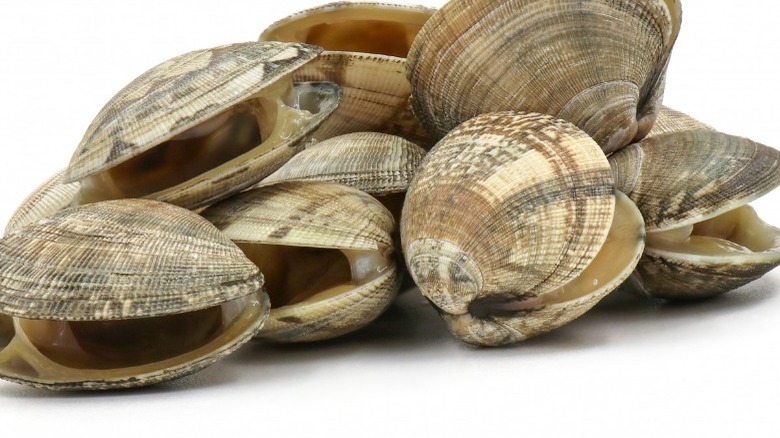The Benefits Of Eating Shellfish
While the idea of consuming something that comes from an exoskeleton may sound unappetizing to some, certain types of shellfish hold important commercial and cultural value in the United States and many parts of the world.
Shellfish are a type of invertebrate that lives in the water (via Britannica). In a culinary sense, shellfish are these types of animals that are edible. There are over a dozen kinds of edible shellfish. You may have heard of or even tried abalone, clam, crab, lobster, mussel, oyster, or scallop (via Nutrition Advance).
Shellfish like clams, mussels, scallops, and oysters are known as bivalves. According to the National Oceanic and Atmospheric Administration, bivalves, or filter feeders, consume plankton through a process that intakes water and filters it through the gills. They live on the floor of the ocean, using their anatomy to attach to rocks or the seabed. The bivalve filtration process can also help reduce pollution from the earth. As such, shellfish that dwell in areas near industrial pollution can become contaminated.
Shellfish are predominantly made up of water — as much as 75%-80% (The Culinary Pro). The remaining parts of the shellfish contain fats, proteins, and minerals that can make them a great source of nutrition. Here's everything you need to know about the nutritional benefits of shellfish. But before you dive into your shellfish of choice, make sure that you are not allergic, as shellfish allergies are quite common (via Nutrition Advance).
Shellfish are a nutrient-dense food
According to a 2017 review published in the journal Comprehensive Reviews in Food Science and Food Safety, most edible shellfish come with a complex nutritional profile that contains amino acids, fatty acids, proteins, plus vitamins and minerals like vitamin B12, copper, iodine, potassium, sodium, and zinc — all of which have health benefits.
Healthline also adds that shellfish not only contain iron and selenium, but they are also a rich source of protein. For example, even eating just 3 ounces of shrimp will give you over 20 grams of protein. Or if you prefer clams, a 3-ounce serving will give you nearly 22 grams of protein. That's comparable to the same amount of protein you'd get from a similar serving of lean beef, which makes shellfish a great alternative to red meat.
Another advantage of shellfish is that they contain relatively few calories, which may help contribute to weight loss (via Healthline).
Also, since shellfish are a rich source of the mineral zinc, eating shellfish regularly may help boost your immune system.
WebMD adds that shellfish contain omega-3 fatty acids, which may not only help you keep your heart healthy, but can also help your cognitive and mental health (per Healthline).


